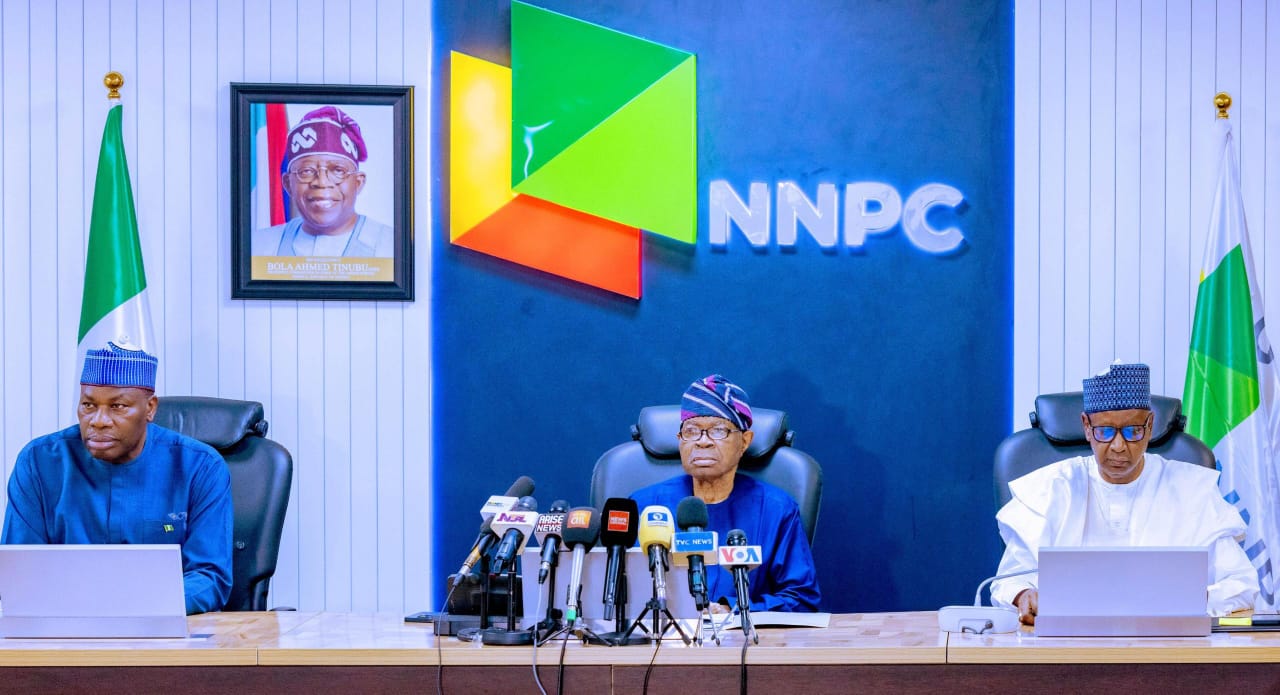The Nigerian National Petroleum Company Limited (NNPCL) has pledged 272,500 barrels per day of crude oil through a series of crude-for-loan deals totalling $8.86bn.
By pledging 272,500 barrels daily, it means that about 8.17 million barrels of crude will be used for different loan deals by the national oil firm on a monthly basis.
This is according to an analysis of a report by the Nigeria Extractive Industries Transparency Initiative and the NNPC’s financial statements.
Under these deals, notable projects include Project Panther, Project Bison, Project Eagle Export Funding (Original, Subsequent, and Subsequent 2 Debts), Project Yield, and Project Gazelle.
According to The PUNCH’s findings, NNPC has already fully repaid $2.61bn in loans, representing 29.4 per cent of the total credit facility, while $6.25bn or 70.6 per cent, remains outstanding.
Also, out of the $8.86bn credit facility, only about $6.97bn has been received from seven crude-for-loan deals.
One of the key projects, Project Panther, involves a joint venture between NNPC and Chevron Nigeria Limited, backed by international and local banks.
The project secured a $1.4bn loan facility, with 23,500bpd pledged to service the debt. Repayment is set to commence after a moratorium, with financing terms including an SOFR (Secured Overnight Financing Rate) plus 5.5 per cent margin and a liquidity premium.
Another significant deal is Project Bison, tied to NNPC’s attempt to acquire a 20 per cent equity stake in the Dangote refinery. However, the national oil company only acquired a 7.25 per cent stake.
The project secured a $1.04bn loan from Afrexim Bank, with 35,000 bpd pledged as collateral. NNPC fully repaid this loan in June 2024.
Project Eagle Export Funding comprises three separate loans aimed at meeting various financial obligations.
The original loan, secured in 2020 for $935m, was serviced with 30,000 bpd and was fully repaid by September 2023.
A subsequent loan of $635m was also fully repaid by the same period. The third tranche, known as Project Eagle Export Funding Subsequent 2 Debt, was secured in 2023 for $900m, with 21,000 bpd pledged. Repayment is scheduled to begin in June 2024, and the loan will mature in 2028.
Project Yield, designed to support the Port Harcourt Refining Company, involves a $950m loan, with 67,000 bpd pledged for repayment.
The repayment of the loan, secured in 2022, will begin in December. This seven-year facility is crucial to refurbishing the refinery and enhancing domestic refining capacity.
However, despite this crude-for-loan arrangement, The PUNCH reports that fuel production at the Port Harcourt refinery has yet to commence, despite multiple postponements as of August. Promises from the Federal Ministry of Petroleum Resources and NNPC have repeatedly fallen through.
More recently, there was the Project Gazelle deal, which aimed to stabilise Nigeria’s foreign exchange market.
In December 2023, NNPC secured a $3bn forward sale agreement, pledging 90,000bpd from Production Sharing Contract assets to cover future tax and royalty obligations.
As of the end of 2023, $2.25bn had been drawn from this facility, with repayments scheduled to begin by mid-2024.
These crude-for-loan deals come at a time when Nigeria is struggling to boost its oil production.
The NEITI 2022-2023 report revealed a significant decline in crude oil output, reaching the lowest levels in a decade. In 2022, the country produced 490.94 million barrels of crude oil, a steep drop from the peak of 798.54 million barrels in 2014.
Although production slightly improved to 537.57 million barrels in 2023, this still represents only 67.16 per cent of the country’s peak production capacity.
One of the major challenges facing the sector is production deferment. In 2023, Nigeria deferred 110.66 million barrels of crude oil, down from 153.44 million barrels in 2022.
The deferment was primarily due to unscheduled maintenance, repair issues, and oil theft.
Despite government efforts to curb these issues, including initiatives to reduce theft and sabotage, operational inefficiencies persist.
NEITI reported that oil theft and sabotage resulted in the loss of 5.25 million barrels in 2023, exacerbating production struggles.
The House of Representatives Special Joint Committee recently directed NNPC to halt further crude-for-loan agreements.
This directive follows reports that the company is planning to borrow an additional $2bn in oil-backed loans amid efforts to settle a $6bn backlog owed to international oil traders, particularly following the removal of fuel subsidy.
The PUNCH earlier reported that the NNPC was in talks for another oil-backed loan to boost its finances and allow investment in its business, according to the Group Chief Executive Officer, NNPC, Mele Kyari.
Kyari said the company wanted the new loan against 30,000-35,000 barrels per day of crude production, though he declined to say how much money it sought.
Nigeria’s government finances rely on oil the NNPC exports, which provides the bulk of crucial foreign exchange reserves. However, pipeline theft and years of underinvestment have sapped oil production in recent years, and the cost of fuel subsidies has further depleted cash reserves.
President Bola Tinubu has been struggling to implement reforms in Africa’s biggest oil exporter – including eliminating fuel subsidies and allowing the naira currency to trade close to market levels – without putting the country’s population at a cost-of-living breaking point.
On August 17, 2023, The PUNCH reported that the NNPC announced that it had secured a $3.3bn emergency crude oil repayment loan from the African Export-Import Bank.
It explained at the time that the oil company would use the loan to support the Federal Government in stabilising Nigeria’s exchange rate.
The facility, among other things, would help the Federal Government attend to some of its dollar obligations, assist the Central Bank of Nigeria in stabilising the foreign exchange market, and provide funding for NNPC.
Providing details about the deal in the document titled, “Everything you need to know about the NNPC Limited’s $3.3bn loan, also known as Project Gazelle,” NNPC said, “This is a financing agreement secured by NNPC Limited to prepay future royalties and taxes to the Federal Government.”
The company also stated that it adopted a lower price benchmark for the $3.3bn crude-for-cash loan to reduce the risk of default and ensure financial stability.
Giving details on the benchmark oil price, the company said the facility used a conservative crude price of $65/barrel to calculate the allocated crude to be produced and sold.
NNPC also said repayments were strategically planned and tied to future oil sales, with conservative pricing in oil sales contracts mitigating the risks associated with oil price volatility.
Amid the existing crude-for-oil deals, President Bola Tinubu approved the sale of crude to local refineries in naira and the corresponding purchase of petroleum products in naira. From October 1, NNPC commenced the supply of about 385,000 barrels per day of crude oil to the Dangote refinery, which would be paid for in naira.
Don’t Miss The Opportunity Awaiting You. Click the link below 👇
https://faikudoka.net/4/5193489
Please don’t forget to “Allow the notification” so you will be the first to get our gist when we publish it.
Drop your comment in the section below, and don’t forget to share the post.
Never Miss A Single News Or Gists, Kindly Join Us On WhatsApp Channel:
https://whatsapp.com/channel/0029Vad8g81Eawdsio6INn3B
Telegram Channel:
https://t.me/gistsmateNG




